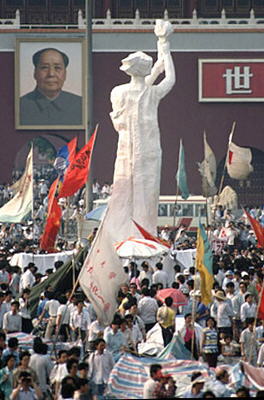history
The record of the Australian Labor Party: high hopes and big disappointments
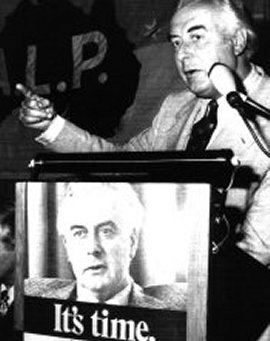
Versailles vs Comintern: two visions of world peace
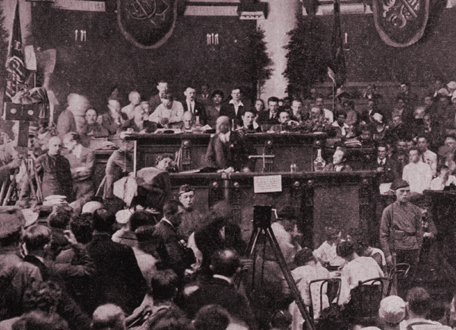
By Barry Healy
June 28, 2009, was the anniversary of the two bookends of World War I, in which it is estimated more than 15 million people died. On that date in 1914 Austrian Archduke Franz Ferdinand was assassinated in Sarajevo and, five years later, in 1919, 90 years ago this year, the Versailles Treaty was signed in Paris.
The first war in which the capacity of modern industry to deploy, feed, arm and dismember people was so hideously demonstrated, WWI was experienced by its victims as the "war to end all wars". Unfortunately, it proved not to be.
Out of the ashes of the conflict two competing visions of world peace arose: Versailles and the revolutionary and democratic alternative represented by the Communist International (Comintern) emanating from the 1917 Russian Revolution.
US President Woodrow Wilson swept into the treaty negotiations declaring: “The world must be made safe for democracy.” Over six months of intense horsetrading at Versailles a new imperialist order was hammered out, resulting in many of the conflicts that followed.
Jean Hale, 1912-2009 -- Farewell to a `most revered activist'
By Sylvia Hale
June 13, 2009 -- Jean Hale (nee Heathcote) was born on July 29, 1912, in Brisbane. Her grandfather, Wyndham Selfe Heathcote, was an Anglican clergyman who opposed the Boer War. His opposition to the Anglican Church's social policies and his opinions, such as this from one of his essays -– “The death of Jesus, as a social reformer using direct action, has been transmuted into the death of a God dying for the world” –- found him at loggerheads with the church and resulted in his leaving to become a Unitarian minister. His public speaking skills, which Jean inherited, were considerable. In October 1916 the Woman Voter reported that, “despite the large seating capacity of the building, thousands of people were turned away” from a debate between himself and Adela Pankhurst (the youngest member of the British suffragist family).
Australia: Towards a history of the Communist Party of Australia
[These articles were first published in Green Left Weekly in 1995 to mark the 75th anniversary of the founding of the Communist Party of Australia.]
By John Percy
September 27, 1995 -- Seventy-five years ago, under the impact and inspiration of the October 1917 Russian Revolution, the Communist Party of Australia was founded. It was a modest beginning, but an historic event. The CPA formed in 1920 finally dissolved in 1991, but for most of its life it was the dominant party on the left in Australia and an important force in the workers movement.
There are many
proud chapters in its history -- the numerous trade union struggles
led; organising the unemployed, women, Aborigines, young people;
important civil liberties fights; and solidarity with international
struggles, in Spain, Indonesia, Vietnam, South Africa and East Timor,
to name a few.
The CPA's founders had a vision of socialist
revolution in Australia, and this was the goal of most of its
rank-and-file members over the years. The party inspired dedication and
commitment from thousands of men and women, and organised the most
militant, idealistic, self-sacrificing section of the Australian
working class.
But it was also a history of mistakes, of betrayals, of lost opportunities.
To mark this important anniversary, Green Left Weekly will be carrying a series of articles on the history of the CPA.
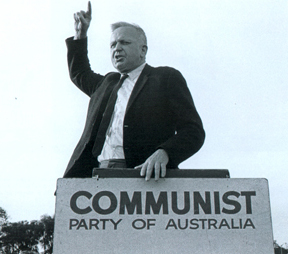
By Dave Holmes
[This talk was presented at the A Century of Struggle — Laborism and the radical alternative: Lessons for today conference, held in Melbourne, Australia, on May 30, 2009. It was organised by Socialist Alliance and sponsored by Green Left Weekly, Australia’s leading socialist newspaper. To read other talks presented at the conference, click HERE.]
Iran: Government neoliberalism, repression fuel mass discontent

By Tony Iltis and Stuart Munckton
June 20, 2009 -- Since the June 12 Iranian presidential election, and the almost immediate announcement of a landslide victory for incumbent Mahmoud Ahmedinejad, Iran has been convulsed by mass protests alleging electoral fraud.
Despite savage repression, including mass arrests, beatings of protesters, attacks on universities and at least 22 deaths, hundreds of thousands of people have taken to the streets daily. The protests started in Tehran on June 13, but have spread throughout the country. The protesters have been calling for a re-run of the election, claiming that Mir-Hossein Mousavi won the elections despite the official results giving Ahmedinejad 64%.
The protests are occurring despite both Ahmedinejad and Mousavi emerging from within the same undemocratic regime and holding similar positions on many issues. Mousavi is presented in the Western media as a “reformer”, however he was prime minister during the 1980s when the regime committed some of its worst atrocities.
Trade unions and New Zealand’s economic crisis

By Grant Brookes
The Industrial Workers of the World in Australia: achievements and limitations
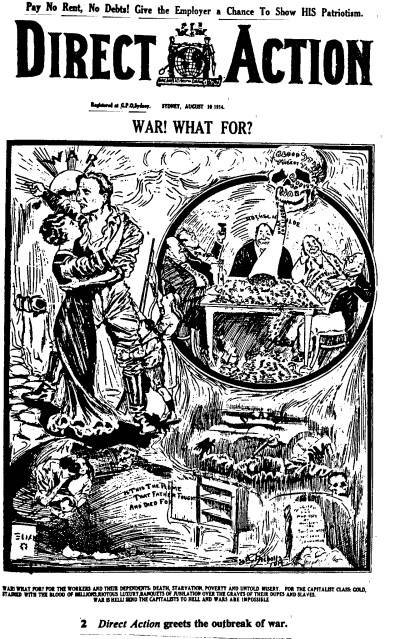
Fidel Castro’s declarations of resistance

Review by Alex Miller
The Declarations of Havana,
by Fidel Castro, with an introduction by Tariq Ali,
Verso, 2008, 138 pages
May 22, 2009 -- As Cuba celebrates the 50th anniversary of the revolution that overthrew the US-backed dictator Fulgencio Batista in 1959, it is fitting that three of the most famous documents relating to the struggle against Batista and the early days of the revolution are published together in a single volume. The Declarations of Havana is part of Verso’s new “revolutions” series.
By reading the three documents back-to-back, one is able to trace the development of the Cuban Revolution from its nationalist-democratic beginnings to its socialist conclusion.
On July 26, 1953, a 26-year-old lawyer named Fidel Castro — along with his younger brother Raul — led an armed attack on the Moncada barracks in Santiago de Cuba, hoping to spark an uprising that would remove the hated Batista from power.
South Korea: The legacy of the 1980 Kwangju uprising

South Korean troops march on Kwangju, May 1980.
On the weekend of May 15-18, 2009, the city of Kwangju, South Korea, held the Kwangju International Peace Forum to celebrate the struggle for democracy in South Korea and to support similar struggles elsewhere in Asia. Christopher Kerr of South Korea-based solidarity group Venceremos caught up with George Katsiaficas to discuss the legacy of the 1980 Kwangju uprising. Katsiaficas is visiting professor of sociology at Chonnam National University and author/editor of numerous books on international social movements including South Korean Democracy -- Legacy of the Gwangju Uprising and Unknown Uprisings: South Korean Social Movements Since World War 2).
* * *
Chris Kerr: What happened in May 1980 in Kwangju and how was it significant to the democracy movement at that time?

